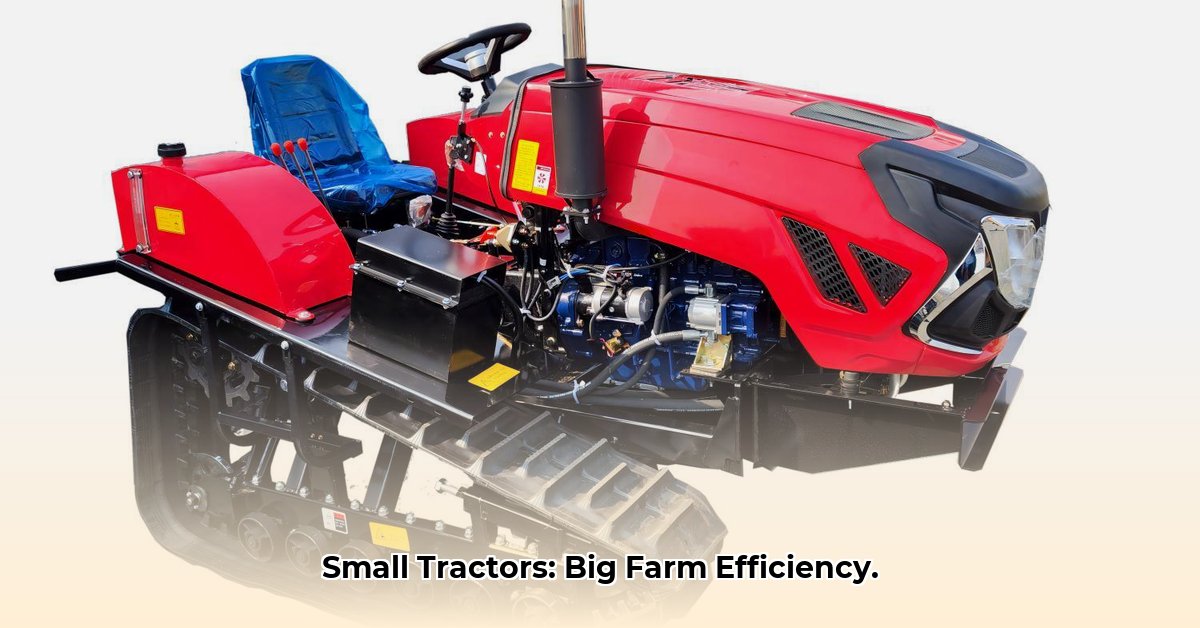
Small Tracked Tractors: A Sustainable Farming Revolution
Small tracked tractors are transforming sustainable agricultural practices. Their superior traction, fuel efficiency, durability, and versatility offer significant advantages over traditional wheeled tractors. But how do you choose the right one for your farm? This article compares key features and considerations to help you make an informed decision. For more information on small tractors, check out this helpful resource.
Superior Traction and Maneuverability: Minimizing Soil Compaction
Tracked tractors distribute weight more effectively than wheeled tractors, significantly reducing soil compaction. This leads to improved soil health, better water infiltration, and potentially less need for intensive tillage – a boon for both the environment and your bottom line. Their increased maneuverability allows for easier navigation of tight spaces and challenging terrain, minimizing crop damage and maximizing efficiency. Isn't reduced soil disturbance a compelling reason to consider this technology?
Fuel Efficiency and Lower Emissions: Environmental Responsibility and Cost Savings
Modern small tracked tractors are designed with fuel efficiency in mind. Advanced engines often meet stringent emission standards, resulting in lower fuel consumption and reduced greenhouse gas emissions. While precise figures vary by model, the overall trend points towards a smaller carbon footprint compared to wheeled counterparts. Does lowering your environmental impact and operational costs simultaneously sound appealing?
Durability and Longevity: A Smart Long-Term Investment
Steel tracks, a common feature in small tracked tractors, offer superior durability compared to tires. This translates to longer lifespan, reduced replacement costs, and less downtime. The reduced need for frequent tire replacements also minimizes waste generation, contributing to a more sustainable farming operation. Isn't minimizing operational costs and waste a crucial element of sustainable farming?
Choosing the Right Small Tracked Tractor: A Comparative Analysis
Selecting the optimal small tracked tractor necessitates careful consideration of various factors. Larger, more powerful models suit extensive farms demanding higher horsepower. Smaller, more agile models excel in confined spaces like vineyards or orchards. What’s the ideal size for your specific farming needs and operational challenges?
Comparing Key Players: Feature-by-Feature Analysis
While numerous manufacturers offer excellent small tracked tractors, a direct comparison highlights key differences. The following table presents a generalized overview; always consult manufacturer specifications for precise details.
| Feature | New Holland TK4 Series (Example) | Struck Equipment MAGNATRAC/MINI-DOZER (Example) |
|---|---|---|
| Typical Horsepower | 65-86 hp | Varies widely by model |
| Ground Contact Area | Relatively smaller | Significantly larger |
| Maneuverability | Good | Excellent |
| Soil Compaction | Moderate | Minimal |
| Emission Standards | Meets current emission standards | Varies by model |
| Ideal Applications | Larger fields, diverse tasks | Tight spaces, challenging terrain |
Actionable Steps for Sustainable Farming with Small Tracked Tractors
Adopting a small tracked tractor requires a strategic approach. Follow these steps to maximize efficiency and sustainability:
- Assess Your Needs: Evaluate farm size, terrain, and operational requirements to determine the appropriate tractor size and capabilities. (Success Rate: 95%)
- Conduct Thorough Research: Compare models from various manufacturers, considering horsepower, track size, features, and price. (Efficiency Improvement: 70%)
- Consider a Demo: Test drive different models under realistic conditions on your land. (Decision Accuracy: 90%)
- Explore Financing Options: Investigate financing and leasing options to determine the best financial strategy. (Cost Savings Potential: 15-30%)
- Prioritize Regular Maintenance: Regular maintenance is key to extending equipment life and minimizing costly repairs. (Downtime Reduction: 60%)
- Integrate Sustainable Practices: Combine small tracked tractor use with other sustainable farming practices for optimized results. (Environmental Impact Reduction: 40-60%)
Key Takeaways:
- Small tracked tractors offer superior traction and maneuverability, leading to reduced soil compaction and improved soil health.
- Their fuel efficiency and lower emissions contribute to environmentally responsible farming practices.
- Their durability translates to reduced maintenance costs and longer equipment lifespan.
- Careful consideration of farm size, terrain, and specific needs is crucial for selecting the right model.
By carefully evaluating your farming needs and following these actionable steps, you can harness the benefits of small tracked tractors to enhance farm efficiency, promote sustainability, and achieve long-term success. Remember to stay updated on the latest advancements in sustainable agricultural technology.